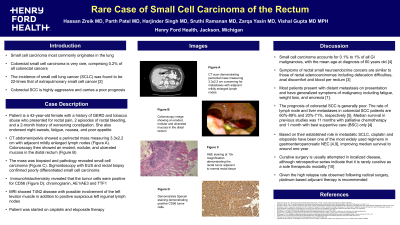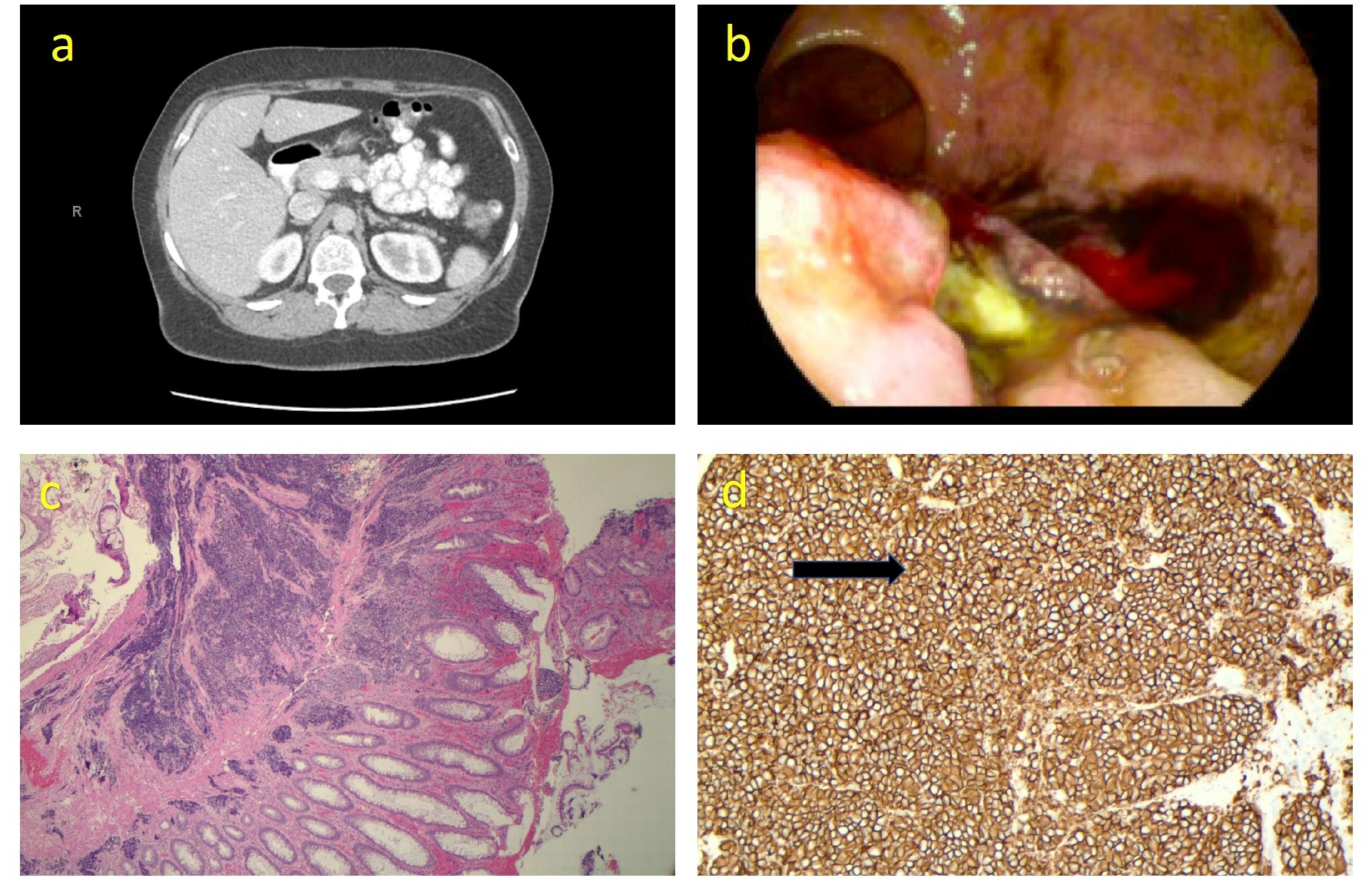Back


Poster Session A - Sunday Afternoon
Category: Colon
A0119 - Rare Case of Small Cell Carcinoma of the Rectum
Sunday, October 23, 2022
5:00 PM – 7:00 PM ET
Location: Crown Ballroom

Has Audio

Hassan Zreik, MD
Henry Ford Jackson
Dearborn, MI
Presenting Author(s)
Hassan Zreik, MD, Parth M. Patel, MD, Harjinder Singh, MD, Sruthi Ramanan, MD, Vivek Kak, MD, Vishal Gupta, MD, PhD
Henry Ford Jackson, Jackson, MI
Introduction: Small cell carcinoma most commonly originates in the lung. Colorectal small cell carcinoma is very rare, comprising 0.2% of all colorectal cancers. The incidence of small cell lung cancer (SCLC) was found to be 22-times that of extrapulmonary small cell cancer. Colorectal SCC is highly aggressive and carries a poor prognosis.
Case Description/Methods: Patient is a 42-year-old female with a history of GERD and tobacco abuse who presented for rectal pain, 2 episodes of rectal bleeding, and a 2-month history of worsening constipation. She also endorsed night sweats, fatigue, nausea, and poor appetite. CT abdomen/pelvis showed a perirectal mass measuring 3.3x2.2 cm with adjacent mildly enlarged lymph nodes (Figure 1a). Colonoscopy then showed an eroded, nodular, and ulcerated mucosa in the distal rectum (Figure 1b). The mass was biopsied and pathology revealed small cell carcinoma (Figure 1c). Sigmoidoscopy with EUS and rectal biopsy confirmed poorly differentiated small cell carcinoma. Immunohistochemistry revealed that the tumor cells were positive for CD56 (Figure 1d), chromogranin, AE1/AE3 and TTF1. MRI showed T4N2 disease with possible involvement of the left levator muscle in addition to positive suspicious left inguinal lymph nodes. Patient was started on cisplatin and etoposide therapy.
Discussion: Small cell carcinoma accounts for 0.1% to 1% of all GI malignancies, with the mean age at diagnosis of 60 years old. Symptoms of rectal small neuroendocrine cancers are similar to those of rectal adenocarcinomas including defecation difficulties, anal discomfort and blood per rectum. Most patients present with distant metastasis on presentation and have generalized symptoms of malignancy including fatigue, weight loss, and anorexia.
The prognosis of colorectal SCC is generally poor. The rate of lymph node and liver metastases in colorectal SCC patients are 60%-89% and 20%-71%, respectively. Median survival in previous studies was 11 months with palliative chemotherapy and 1 month with best supportive care (BSC) only.
Based on their established role in metastatic SCLC, cisplatin and etoposide have been one of the most widely used regimens in gastroenteropancreatic NEC, improving median survival to around one year. Curative surgery is usually attempted in localized disease, although retrospective series indicate that it is rarely curative as a sole therapeutic modality. Given the high relapse rate observed following radical surgery, platinum-based adjuvant therapy is recommended.

Disclosures:
Hassan Zreik, MD, Parth M. Patel, MD, Harjinder Singh, MD, Sruthi Ramanan, MD, Vivek Kak, MD, Vishal Gupta, MD, PhD. A0119 - Rare Case of Small Cell Carcinoma of the Rectum, ACG 2022 Annual Scientific Meeting Abstracts. Charlotte, NC: American College of Gastroenterology.
Henry Ford Jackson, Jackson, MI
Introduction: Small cell carcinoma most commonly originates in the lung. Colorectal small cell carcinoma is very rare, comprising 0.2% of all colorectal cancers. The incidence of small cell lung cancer (SCLC) was found to be 22-times that of extrapulmonary small cell cancer. Colorectal SCC is highly aggressive and carries a poor prognosis.
Case Description/Methods: Patient is a 42-year-old female with a history of GERD and tobacco abuse who presented for rectal pain, 2 episodes of rectal bleeding, and a 2-month history of worsening constipation. She also endorsed night sweats, fatigue, nausea, and poor appetite. CT abdomen/pelvis showed a perirectal mass measuring 3.3x2.2 cm with adjacent mildly enlarged lymph nodes (Figure 1a). Colonoscopy then showed an eroded, nodular, and ulcerated mucosa in the distal rectum (Figure 1b). The mass was biopsied and pathology revealed small cell carcinoma (Figure 1c). Sigmoidoscopy with EUS and rectal biopsy confirmed poorly differentiated small cell carcinoma. Immunohistochemistry revealed that the tumor cells were positive for CD56 (Figure 1d), chromogranin, AE1/AE3 and TTF1. MRI showed T4N2 disease with possible involvement of the left levator muscle in addition to positive suspicious left inguinal lymph nodes. Patient was started on cisplatin and etoposide therapy.
Discussion: Small cell carcinoma accounts for 0.1% to 1% of all GI malignancies, with the mean age at diagnosis of 60 years old. Symptoms of rectal small neuroendocrine cancers are similar to those of rectal adenocarcinomas including defecation difficulties, anal discomfort and blood per rectum. Most patients present with distant metastasis on presentation and have generalized symptoms of malignancy including fatigue, weight loss, and anorexia.
The prognosis of colorectal SCC is generally poor. The rate of lymph node and liver metastases in colorectal SCC patients are 60%-89% and 20%-71%, respectively. Median survival in previous studies was 11 months with palliative chemotherapy and 1 month with best supportive care (BSC) only.
Based on their established role in metastatic SCLC, cisplatin and etoposide have been one of the most widely used regimens in gastroenteropancreatic NEC, improving median survival to around one year. Curative surgery is usually attempted in localized disease, although retrospective series indicate that it is rarely curative as a sole therapeutic modality. Given the high relapse rate observed following radical surgery, platinum-based adjuvant therapy is recommended.

Figure: Figure 1: a. CT scan demonstrating perirectal mass measuring 3.3x2.2 cm concerning for metastases with adjacent mildly enlarged lymph nodes. b. Colonoscopy image showing an eroded, nodular and ulcerated mucosa in the distal rectum. c. H&E staining at 10x magnification demonstrating the rectal tumor (black arrow) adjacent to normal rectal tissue d. demonstrates Special staining demonstrating positive CD56 tumor cells.
Disclosures:
Hassan Zreik indicated no relevant financial relationships.
Parth Patel indicated no relevant financial relationships.
Harjinder Singh indicated no relevant financial relationships.
Sruthi Ramanan indicated no relevant financial relationships.
Vivek Kak indicated no relevant financial relationships.
Vishal Gupta indicated no relevant financial relationships.
Hassan Zreik, MD, Parth M. Patel, MD, Harjinder Singh, MD, Sruthi Ramanan, MD, Vivek Kak, MD, Vishal Gupta, MD, PhD. A0119 - Rare Case of Small Cell Carcinoma of the Rectum, ACG 2022 Annual Scientific Meeting Abstracts. Charlotte, NC: American College of Gastroenterology.
